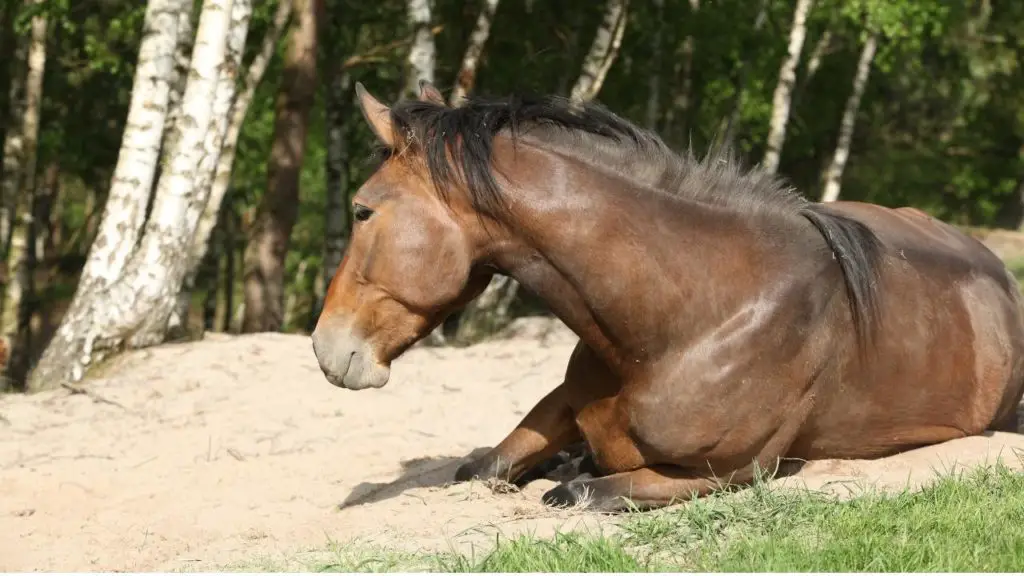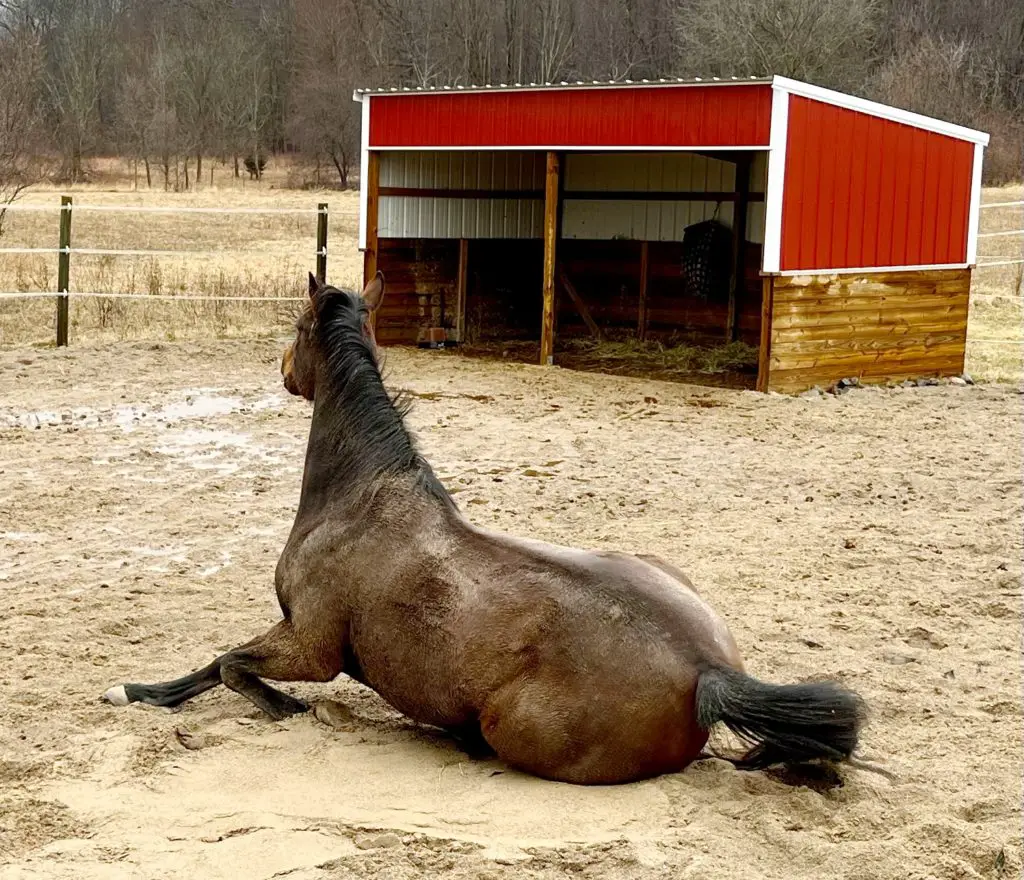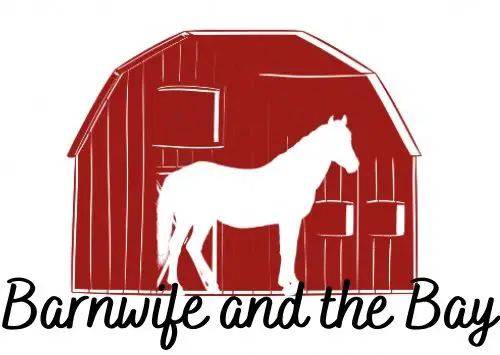
Horses sleep standing up, right? So why would they ever need to lie down?
Lots of reasons! In fact, when horses sleep standing up, it’s more of a light sleep. They need to lie down to get into the restorative rapid eye movement (REM) phase of sleep that allows their brains and bodies to recharge.
Read on for more details about horses’ sleep, and the many other reasons they lie down.
Why do horses lie down?
A horse might lie down if they are:
- Sleeping
- Comfortable and relaxed
- Tired
- Sick or painful
- About to roll
Horses lie down to get into a deep sleep
Horses have anatomy in their legs called a stay apparatus. This allows them to relax and fall asleep in a standing position, where they take most of their daily rest. However, in order to enter the REM phase of sleep, they need to lie down. They will lie flat on their side with their head on the ground.
This is when inexperienced folks will think a horse might be dead, because we’re not used to seeing them like this. To make it even more surprising, a sleeping horse will sometimes move their legs as if they are dreaming of galloping through a field.
How much sleep does a horse need?
Horses need at least 30 minutes of REM sleep per day, where they lie down flat. This means horses do not sleep all night like we might expect them to. They typically lie down to sleep during the period between midnight and 4am.
Sometimes at a show or overnight trail ride, a horse will not get their 30 minutes of REM sleep, and that’s ok. Missing a day or two of sleep is not a big deal to a horse. But missing more than that might be. Sleep deprivation can set in after a few days without proper sleep.
What to watch for
Signs of sleep deprivation in horses are:
- Lack of evidence that they’ve laid down (no bedding or dirt in the tail or mane)
- Increased daytime drowsiness
- Poor performance
- Wobbly or weaving when standing or walking
- Collapsing or nearly collapsing
- Recurrent abrasions on knees and fore fetlocks (from collapsing)
- Unexplained facial injuries (from collapsing)
- Weight loss
- Increased irritability and/or hypervigilance
A horse lies down when they’re in physical pain
Abdominal pain is a common reason why a horse might lie down. Abdominal pain in horses is referred to as colic. One of the colic signs is lying down. Colicky horses may roll or just lie quietly looking miserable.
Musculoskeletal pain or limb pain could be another cause.
A sick horse may lie down
Illness from something other than colic can make a horse want to lie down or not be able to rise once they are down. This might be due to weakness or a neurological condition.
Horses lie down when they’re tired
If a horse gets very tired from running and playing, or a hard workout, they may lie down to rest after they have calmed down.
More reasons healthy horses lie down:
Enjoying a sunny day. Where I’m located we get relatively few sunny days in a year, and the horses take full advantage of them by stretching out on the sand or grass and sunbathing.
They’re relaxed. If a horse is relaxed and comfortable, they may lie down and just chill without going to sleep.
They’re napping. Horses might lie down or stand up to nap.
They are comfortable and happy. As a prey animal, a horse will only put themselves in the vulnerable position of lying on the ground if they feel comfortable and confident in their surroundings. If your horse is lying down and stays down when you approach, it’s a good sign that they are comfortable with you and trust you.
They are trained to lie down on cue. Lying down is a common trick to teach a horse. Usually it’s fairly obvious that this is the reason a horse is lying down. However there may be a case where you’ve bought a new horse without knowing that it knows this trick, and it’s showing you. Sometimes horses will offer behaviors or tricks they know without being asked.
They are about to roll. Horses love to roll.
Horses can be tempted to lie down and roll in:
- Snow
- Sand
- Water
- Mud
- Lush grass
- Deep bedding
It’s right before a show and you want them to be clean. This one is more of a joke than a real reason. But ask anyone with a grey or white horse that they show, and they will likely tell you that it seems the urge to lie down and roll is especially strong when they are clean and their class is coming up.
What to watch for
These are the stages to the process of a horse lying down:
- They put their head down very close to the ground.
- They may circle a few times once they’ve found their spot.
- They’ll put all their legs close together underneath them.
- They’ll go down onto their knees.
- Finally, they’ll lower their hindquarters onto the ground. They may doze like that on their sternum, or roll onto their side and stretch their legs out.
Horses will sometimes try to lie down and roll even with tack and a rider on.
If you’re riding over snow, sand, or water and feel your horse start to go down onto its knees, cue him firmly to move forward. If he continues to go down, the best thing to do is hop off and stay out of the way of flying hooves while encouraging him to get up.
When should I worry about my horse lying down?
Horse owners should know their horse’s normal behavior patterns, and watch for deviations from that normal.
Different horses like to lie down different amounts, depending on personality and circumstances. Some horses will lie on the ground for an hour multiple times per day. Others will only lie down for the minimum time required to get their sleep.
However, if any horse is down for multiple hours at one time, this is a problem. Blood flow and breathing can be compromised and irreversible damage to tissues can occur if a horse is down for an extended period of time.
For old horses, it is especially important to keep an eye on how easily they are getting down and up. If they are not lying down because it’s hard for them, they can become sleep deprived.

Horses roll onto their sternum and extend their front legs in order to get up.
A horse that’s been down for a long time may be stuck, or cast. A horse can get cast if they lie down too close to a wall or fence. This can prevent them from rolling onto their sternum, bringing their hind limbs under them, or extending their front legs out in front of them. These are all steps they need to do in order to get up.
A cast horse needs human intervention quickly to help them get up and avoid the problems caused by being down too long.
How do I know if my horse is getting enough sleep?
Even if you are not able to see them lying down flat very often, chances are they are getting enough sleep if they are not exhibiting any of the signs of sleep deprivation listed above.
How do I make sure my horse is getting enough sleep?
Provide a comfortable surface to sleep on with deep enough bedding, grass, or sand.
Provide a safe environment where they can feel secure, eIther inside a barn or outside in a paddock or pasture. This also includes the herd. There should be no bullying or threatening social dynamics from herd mates.
Work with your veterinarian to rule out health conditions that could affect their willingness to lie down and sleep.
Like this article? Don’t sleep on these:

